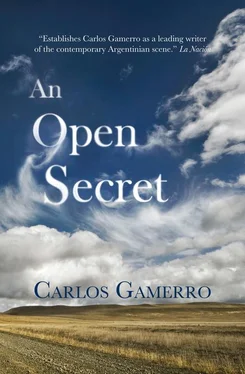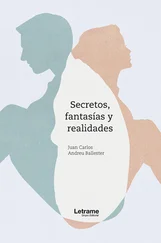“And that’s all.” Don Alfio takes a loud and futile slurp on his empty maté and sits there staring vacantly at it. To escape from myself for a little while, from the boundless disquiet in my chest and the anguish garrotting my throat, I ask him if I can borrow his computer for a while. Delighted to have found a kindred spirit he opens the gates of paradise for me and over the hour I spend checking my mail and answering messages I manage to shake off the asphyxiating feeling that the universe ends at the edges of this quadrangular patch of Santa Fe pampas. Guido sticks around and keeps up a conversation with Don Alfio that this time next year he’ll attribute to his brother, and, before we leave, Don Alfio asks me for a favour — can I sort out some problems he’s been having opening a short cut to a Web address, which turns out to be a Hungarian website devoted to child pornography. On the way back Guido drives the delivery truck in silence through the brown fields untransfigured by the sunset. “They went to look for my grandfather too, but he wouldn’t go,” he says at one point. “Not in working hours he told them,” Guido adds and I nod as if I understood.
MENDONCA HAD ALREADY MENTIONED something to me about the delegation that rainy afternoon I’d been to see him at his pharmacy: “But there came a point when we drew the line. A delegation of us went to see Superintendent Neri. To ask him to abandon his designs. The cream of the community were there: Don León Benoit, Eugenio Casarico, Don Honorio Moneta, whom I don’t know if … oh you do, Sacamata, Senior of course, and your grandfather naturally. Let me see, have I forgotten anyone, erm … I shan’t give the names of those who declined to take part so that their memory won’t even live on in local gossip … We assembled outside the door of the headquarters as a man, and knocked, demanding an immediate appointment with the chief of police. He agreed to see us when he found out who it was. We want to know what you’re up to Superintendent, we began without further ado, and very soon the room was ringing with the yells of half a dozen people heatedly arguing, the Superintendent banging his fist on the desk saying Who are you to tell me how to do my job and us answering If we don’t who will and demanding he give his word that things would go no further. He gave it us after a bitter verbal exchange and I now realise our greatest mistake was to trust him, to treat him as one of us, to consider him … a gentleman. He abused our good faith you understand. Gave us guarantees.
It’s easy in retrospect to say the military and the police back then lacked any sense of honour, but in those days most of us still thought … I reproach myself bitterly anyhow. Our gullibility cost the boy his life. It’s hard to forgive yourself … The chief of police has listened to reason, we informed the town when we left. That may have been a mistake too. We made everyone drop their guard as it were. But we were acting in good faith. Our most serious crime was naivety.”
“OH,” says Don Alfredo Sacamata senior that night, when our paths cross at the bar table after we’ve got back from Don Alfio’s, “I didn’t go. They came looking for me that they did. I don’t want any trouble with the police I told them. If you want to go you go. You have to walk on eggshells where things like that are concerned,” he pours into the scathing ears of Iturraspe, the indifferent ears of Porfirio Dupuy, the uncomfortable ears of Don León, the irked ears of Guido, the ulcerated ears of yours truly. “It was none of my business after all. I didn’t have anything against the Ezcurra boy but—”
“We’re not going to start with that again are we Alfredito,” Don León interrupts him. “Everyone did what they thought best and your own conscience is the best judge of any mistakes you might’ve made. The only thing I will add,” he says looking right at me, “is that I was there and I saw how your grandfather did everything possible to get Superintendent Neri to change his course. You have my word,” he adds unnecessarily, and not knowing what to reply I sit there staring at him for a while; but he doesn’t say any more. I thank him for the white lie with a nod of the head and leave my head tilted slightly until they’ve left.
WHAT I REMEMBER MOST about my grandfather was his ability with his hands, the grace and ease with which he connected with the material world; it was people that were always the problem for him. At the end of the backyard by the chicken coop, with which it shared the same long corrugated-iron roof, stood the shed where he worked. The cement floor always covered in a fine layer of sawdust and dirt, the carpenter’s workbench with the edges bitten by countless missed sawstrokes, the lone green lampshade dangling on a long flex strung from the ceiling, the walls and corners invisible behind the profusion of objects hanging or leaning on them, the peculiar quality of the sunlight coming through a dusty window … Entire siestas I could spend studying the various traces of my grandfather’s handiwork, like an archaeologist excavating some ruins to deduce from them the characteristics of a world that would never be mine. It was as if I already knew that that ability, that familiarity with the purely material side of things, was forbidden to my purely mental intelligence, not for now but for ever. I, who slip in and out of impregnable software as smoothly as a hand into a silk glove, have always been incapable of hammering a nail without bending it, sawing a plank other than in a zigzag, or unravelling a tangle of string without feeling that it’s a living thing whose only reason for existence in the cosmic scheme of things is to exasperate me with an obstinacy I can’t help but take personally. So I’d sit and watch him as he worked — I wanted to locate that knowledge, discover what there was in the movement of his hands that made the block of rough wood an eddy of dark water flowing beneath his eyes and fingers, or whether it was his eyes or his hands that possessed the gift of ordering space into precise geometries using just nails and bits of wood and chicken wire. Nothing inert was strange to him — he was equally at home welding and riveting wrought-iron gates and lamp posts as carving a piece of marble for a tabletop or night table, or bending a wooden plank as if it were soft to make a mailbox. And that was why the encyclopaedia of that knowledge, the visible sign not only of everything he’d made, but also of everything he was capable of making, was his shadow board — a vast sheet of wood made vaster by memory, as long as a school blackboard and twice as high, on which all the instruments of his trade were hung within reach of his sure hand, some with shapes so recondite that I could spend hours developing theories about their potential functions, and beside whose complexity, the frequently ordinary use my grandfather’s hands put them to at my request was usually rather disappointing. Each one had a precise place assigned to it on the board, a cast patiently moulded by my grandfather that it and only it could occupy. Where someone of a more practical bent would make do with a nail, he’d place a wooden block whose convexity would snugly receive the inner curvature of a saw handle or the concavities of a hammerhead, or he’d cut and bend some sheet metal to provide a made-to-measure resting place for a wrench or a pair of pliers. I sometimes think that nothing in this world represents him as well as that shadow board — it says more about him than all the papers he signed as a provincial lawyer and politician; and I know we never had a better time than when he used to let me watch him work and without any explanation whatsoever, without uttering a single word, he’d show me what the different tools were for and the particular way of bringing out the best in each material. But I’ve never got to grips with the mute obstinacy of the material world, which must be why I ended up devoting my life to computers, every bit as irrational, capricious and crafty as their makers. And what’s true of me, capable of howling insults at the flush button on a toilet because it refuses to stop hissing and dripping, was true of my grandfather, Don Julián Echezarreta, with people. The lowliest member of staff on the ladder was just as likely to drive him to distraction as the provincial governor; his reactions were always disproportionate and turned out to be the death of him. Apoplexy, diagnosed Dr Alexander, not without elegance, and at the funeral, which wasn’t here but in Rosario, I can remember my grandmother’s stern expression as she told my mother, “Cry all you like but stop repeating ‘Papuchi Papuchi’ out loud,” and how snugly the wax doll fitted into the wood and satin bed made to measure for it. His face wore an almost happy expression; perhaps — a secret kept even from himself — he’d always wanted to rejoin the peaceful existence of inert matter, which had never let him down. He almost always cared about me, but I think he knew I secretly found him a disappointment. He was barely capable of being a grandfather and, for the three long months of summer at least, I asked him to be a father to me as well.
Читать дальше












